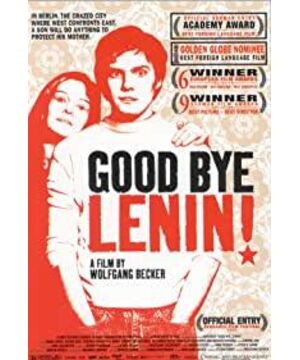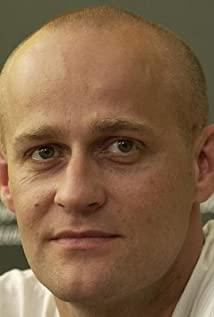I've seen a lot of reviews about this movie before. This is a very bad habit of mine. Like this, the tone is set first, and there are very few words left for me to say.
I like the slightly sad tone that follows the movie. Like most people say, the movie is more of a memory than a political one. The protagonists are a group of people who are facing changes. More people can quickly accept and adapt, and quickly forget everything in the past, including the good and the unpleasant. But for all this, Mrs. Kerner had sacrificed too much but couldn't let it go, not to mention that when the great change happened, she was sleeping deeply and soundly. Hence the story of white lies.
I think Mrs. Kerner actually knew the truth, the constant news anchor of GDR TV, the Coca-Cola and IKEA advertisements posted everywhere on that sunset afternoon, the huge roar of the helicopter carrying the demolished Lenin statue bluntly pressing down in front of her eyes, Including the explanation of Alex's nurse girlfriend Lara... It's just such a lie. She is too reluctant to expose it. She chose to exchange it with another truth. After learning the real reason for his father's departure, Alex walked away sadly, Arine frantically went looking for letters from her father that had been sealed by her mother. Mrs. Kerner, who told the truth, seemed to feel that she could leave with peace of mind, so on the third day after Alex finished the lie, her ashes drifted away with the smoke and dust over the former GDR. This ending with a dark wound seems more perfect, because Alex's sad narration sounded at the end, "Only when I remember my mother, I will think of that country." Material shortages, totalitarian politics, for Alex's memories, The GDR under the Soviet model is not just such a flawed impression, but more about the warmth of mothers.
Then I want to say a few paragraphs that have nothing to do with the movie.
I was born on July 10, 1989. Before I could walk or speak, the Berlin Wall fell. I don't read much history, I just know that there were such days. 1989 was a special year. I should be the same age as the Paula in the movie who learned to walk. At the last military parade in the GDR, everything in the 79-square-meter room was trembling uncomfortably by the sound of the army's neat steps, and the little guy cried incomprehensibly in Alex's arms. We are a little embarrassed in such an age. The domestic turmoil seems to be closer to me, but the truth is always too far away and buried too deep. Curiosity is constant. I can’t choose to believe the party and country that my dear ones have concealed, nor can I choose to believe in foreigners and Taiwan compatriots who exaggerate the facts so cutely, so I would rather tell myself while guessing that it’s just an exaggerated rumor, and then immerse myself in the so-called happy life. drowned.
Born in 1989, never believed in generational division but thought it was absurd due to self-centeredness. We do not have the so-called shocking subversion like the post-80s generation, nor do we only focus on selling our own experience like the post-80s generation did. We seem to be more puzzled and confused as we live in the gaps. The front waves are not extinguished, and the back waves hit, so we are stranded on such a dangerous beach prematurely.
Going too far. . . In the end, it's a good movie.
View more about Good Bye Lenin! reviews











